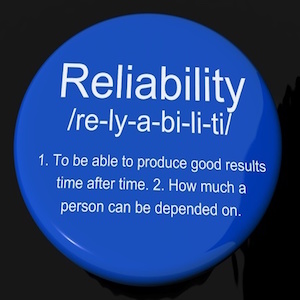1217″]
“Life is like a game of cards where
reliability is the ace card”
– Edgar Watson Howe
People inherently value reliability. Every day we place enormous value on things such as reliable internet connectivity, mobile phone service, planes taking off on time, our cars getting us from A to B and our family, friends and colleagues doing what they say they will do.
When these things are reliable, they not only afford us greater efficiency and peace of mind but also help us forge stronger relationships and deliver greater results. Investors, shareholders, leaders, consumers, neighbours and friends all look for reliable people. Why? Because we place great importance on people and businesses who are able to deliver consistently good results time after time and who can be depended upon to deliver on commitments and promises. Fundamentally they make life (and what we do) easier, more enjoyable and more rewarding.
As leaders, recognising this importance and value is critical to our success. A team or business that delivers reliable results is really only a collective of reliable individuals. So with this in mind, business reliability starts with us as leaders and in our ability to engender it in the people we work with. Understanding how our people perceive and regard our reliability can greatly impact our careers, opportunities and abilities to successfully deliver. People are more likely to trust us to get things done with freedom and autonomy on how we deliver; new and fresh opportunities are more likely to emerge; and the quality and depth of relationships and subsequent loyalty built tends to be greater.
Given that a core element of reliability is doing what we say we will do, communication is key. Neil Crofts, a leadership and culture expert suggests that a big reason so many businesses and organisations are perceived as unreliable is a mixture of over ambition, under commitment and a lack of real clarity about what they are communicating. He suggests we need to give greater consideration to exactly what we committing to and subsequently communicating: information, promises or aspirations. Failing to give enough thought to the difference between each can have an enormous impact on how reliable we are considered to be. His example of train services succinctly demonstrates this point:
Information: The next train is going to be 10 minutes late
Promise: We promise 99% of our trains will be on time
Aspiration: Our aim is for 99% of trains to be on time
Since reliability is such a fundamental aspect of our success, we should all be asking ourselves ‘How reliable am I?’ and what can I do to create it? I would encourage you to consider how you can apply the following six actions:
- Manage expectations: When committing to responsibilities, roles and people be realistic, upfront and transparent about what, when and how you are committing to. Misaligned or ambiguous expectations can prove costly to both you and your business.
- Learn to say ‘No’: All too often the reliable leader is the first person asked to take on more responsibility – because they always deliver! Learning to say no and developing the art of discretion is a critical part of not over committing or over promising.
- Develop strong organisational awareness: As leaders you need to determine what and how you can configure things to ‘make stuff happen’. What can you change and what can’t you? Knowing the difference will help you avoid committing to things beyond your control or influence.
- Do what is right and not just what you have to: Regardless of what we are committed to, we all have an obligation to do what is right and not just do what we have to. Given that we are all part of a team and community, how we play the game is just as important as the tasks and results required of us.
- Build positive emotional reliability: Reliable leaders cultivate the skills required to navigate the unknown and don’t allow circumstances dictate their behaviour. They make the most of situations and are able to demonstrate courage and resilience under pressure.
- Communicate, Communicate, Communicate! Take a proactive approach to communicating with relevant team members, stakeholders and networks. Avoid surprises, remove ambiguity, provide updates – good, bad and indifferent – and always honour the timelines and communication channels committed to.
Regardless of your position, title or tenure, reliability can and should be a cornerstone of your reputation. Essentially, we all aim to collect reliable people and avoid the unreliable. Make sure you are worth collecting!
As always I would love to hear your thoughts.

If you would like to explore ways to reinvigorate your career with confidence, clarity and purpose, please contact Margot on 0400 336 318.

